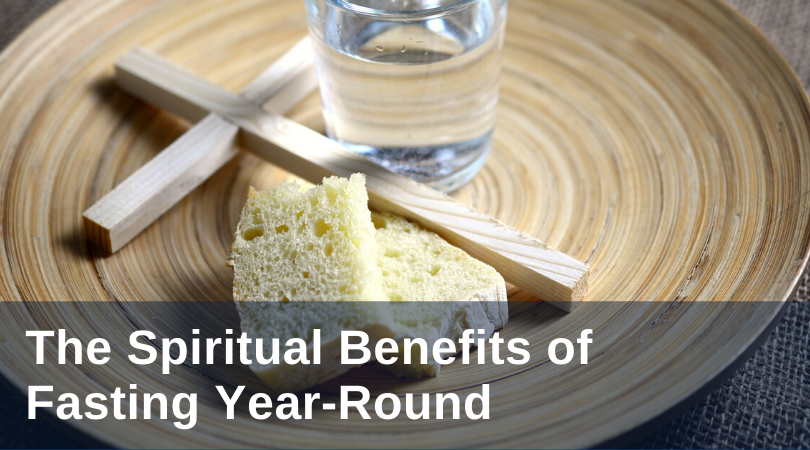
I started daily 16-hour fasts in July of 2019 after researching the benefits of intermittent fasting. When I was presented with a concrete plan for turning fasting into a more intentional spiritual practice, I discovered something much more rewarding than physical discipline.
In February I was given a copy of Eat, Fast, Feast, a Christian guide to fasting by Jay W. Richards which outlines a six-week fasting plan and keto diet to accompany the Lenten season, gradually increasing in intensity until Easter. I opted out of the keto aspect, but the basics of the fast were as follows:
Week 1: Eat normally. I continued with my 16:8 daily fast. Mini-feast on Sunday (unrestricted eating both in terms of when you eat and what).
Week 2: Continue with the 16:8 daily fast. Mini-feast on Sunday.
Week 3: Lengthen the daily fast to 20 hours. Mini-feast on Sunday.
Week 4: On MWF, fast for 23 hours. Fast for 20 hours the other days of the week. Mini-feast on Sunday.
Week 5: On MWF, fast for 23 hours. Restrict calories to about 400–600 each day. Fast for 20 hours the other days of the week. Mini-feast on Sunday.
Week 6: Conduct 36–72 hour fast during the first part of the week. Fast for 20 hours Wednesday through Saturday. Feast on Easter Sunday.
When the challenge intensified during the third week and I began to feel hunger pangs more frequently, I offered up my suffering for those who go without food due to circumstances rather than choice. I began to cherish this discipline, especially because I had more time to engage in my faith due to less time needed for meal preparation and clean-up.
While I looked forward to the Sunday mini-feasts, I noticed that, as time went on, my hunger actually lessened. I didn’t need to eat as much to fill me up as I had before starting this journey, and I was more intentional about the food I was putting into my body, even though fasting isn’t a diet in the traditional sense.
Richards provides guidelines for how to feast appropriately on Sundays, noting that mini-feasts are not opportunities to binge, undoing all of the work of weekday fasting. He advises expanding your eating window to 12 hours and indulging in a treat you may have chosen to avoid during the week, but not consuming a significantly higher number of calories.
I started spending an hour at Eucharistic Adoration each week, typically right before my one-hour eating window during weeks 4–6. This helped me focus on Christ instead of my hunger when my fast was the most challenging.
It became easier to offer up my fasts as social distancing regulations took hold and people I know began to suffer due to COVID-19. By the time I began my 36-hour fast, I had a system: acknowledging any hunger I felt, offering a short prayer of thanksgiving for the food awaiting me later that week, and praying for those who had lost their jobs or struggled to put food on the table.
Had I embarked on this fasting plan for any reason other than a desire to grow in virtue, I would have missed the connection Richards (and many others before him) makes between fasting and the spiritual life. St. Augustine said, “Fasting cleanses the soul, raises the mind, subjects one’s flesh to the spirit, renders the heart contrite and humble, [and] scatters the clouds of concupiscence” (Richards, 4). My Easter Sunday feast was joyful this year because I glimpsed these things Augustine mentions, reflections of a closer union with the Lord.
Though during the Easter season we are called upon to celebrate Christ’s victory over death, it’s important to continue to mark our feasts with a measure of discipline. In fact, in solidarity with the Higher Community for Human Fraternity, Pope Francis has asked Catholics throughout the world to spend this Thursday in fasting and prayer alongside people of all religions.
I have decided to continue daily 16-hour fasts indefinitely. This discipline has become part of my daily routine, and, given the suffering that continues to intensify around me, fasting feels like the least I could do to practice solidarity.
If you’re thinking about fasting, I recommend starting with 16-hour fasts. This is considered the easiest and most sustainable way to ease into intermittent fasting, and it’s a good springboard for other, more intense fasts. Put some thought into mapping out your meals each week to eliminate binge-eating. Listen to your body, always. And try to see the joy that comes from committing to a practice like this.
If you have any questions or would like to share your fasting experience, let me know in the comments! I’d love to hear from you.
Like what you read? Submit your email below to have our newest blogs delivered directly to your inbox each week.
Featured image by congerdesign via pixabay


